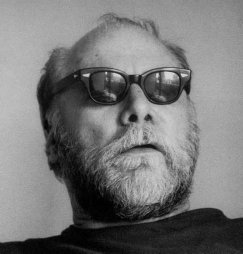Reprinted here with the permission of
THE OREGONIAN, PORTLAND, OR
SATURDAY, FEBRUARY 8, 1997
Fahey bedevils his listeners
again
By
JOHN FOYSTON
of
The Oregonian staff
A recent article in The New York Times about guitarist John Fahey cautioned
that influential American artists are often cranks recalcitrant and inscrutable.
Fahey is all of that and a wizard guitarist to boot but not
every one of the 300 or so people at the Aladdin Theater Thursday night
would agree with both halves of the Times assertion. Especially those who
walked out early, mystified by Fahey's spiky explorations of dissonance
and the internal harmonies of noise.
They were a small percentage of the crowd; most sat quietly for an
hour and several tunes until at the end of "Fanfare" from his new CD
"City of Refuge" Fahey glanced out at the room and said "Well folks,
that's about it for the show tonight." People clapped vigorously as Fahey
walked off stage without further comment. Though the lights stayed down,
the shouts of "more" quickly died with the applause clearly, he's
not an encore kind of guy.
Precisely what kind of guy he is has always bedeviled listeners. Brilliant
and eclectic come easily, but the rest of the description is elusive.
In the early '60s, Fahey seemed to be an acoustic revivalist and maybe
even part of the Great Folk Scare.
Fahey quickly shrugged free of any labels. "While other folkies
earnestly sang the "Wabash Cannonball" Fahey released albums such as "Death
Chants, Breakdowns and Military Waltzes" and recorded songs that included
taped segments of traffic over a bridge.
Chronic fatigue syndrome and drinking found him living in a men's shelter
in Salem in the 1980s. But Fahey's music never went away, and a surprising
array of musicians claim him as an influence, such as Leo Kottke and Sonic
Youth's Thurston Moore. Fahey regained his health and quit drinking and
has begun work on a variety of new projects. "City of Refuge" (in stores
on Tuesday) on Tim/Kerr Records is the first of these and shows Fahey's
increasing fascination with industrial music and sampling.
The tune that propelled the dozen or so early risers up the aisle was
an example of Fahey's refusal to be pigeonholed. Even when he played
acoustic guitar, he played it through an amplifier and traded the dry,
close-miked sound of his early records for a flat, electronic twang. He
also played several tunes on what might be best termed a prepared lap-steel
guitar, an old aluminum Rickenbacker "frying pan" that had the strings
slacked off to promote Koto-like buzzing and resonances.
The result abetted by slide bassist Jeff Allman was both dissonant
and transfixing and a little like the futuristic electronic squawks and
beeps of the score for "Forbidden Planet."
But the acoustic guitar tunes showed Fahey at his idiosyncratic best.
The notes spun out of his guitar as he music surged and eddied, unbounded
by style here were waves of .tidal fingerpicking backing up to swatches
of Delta blues. He moved a complex fistful of chords up and down
the neck and tickled out weird little nursery rhymes and Transylvanian
dance melodies. He began one song with a gently mutated "Silent Night"
and ended it with a crystalline "0 Holy Night."
In one song, he played a beautiful fingerpicked melody briefly and re-turned
to it later, playing it over and over, setting up a palpable tension and
withholding resolution from the audience. As he repeated that phrase, he
looked off to the side, inscrutable indeed behind white beard and shades,
head nodding to an 'internal beat only he could hear.
And isn't that the way of all true artists?
